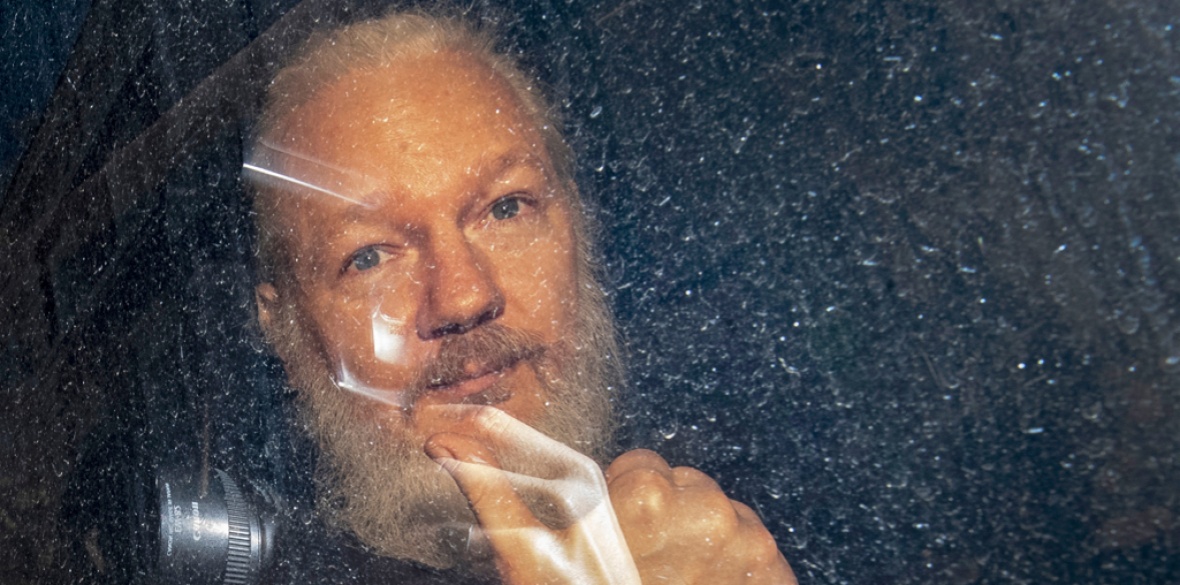This is the last article you can read this month
You can read more article this month
You can read more articles this month
Sorry your limit is up for this month
Reset on:
Please help support the Morning Star by subscribing here
AS SHE entered the Royal Courts of Justice on Wednesday morning, Julian Assange’s fiancee Stella Moris paused to address protesters.
Beaming smiles, she told the crowd that the previous day she had been allowed to embrace Assange for the first time in 17 months.
“Throughout my time in Belmarsh, I held his warm hand. Julian has been denied the love and affection of his family… [he] and the kids will never get this time back.”
Four hours later, she was on the same spot, surrounded by the crowd with tears streaming down her face.
“We love you, Stella,” shouted someone from the crowd, but the mood had changed dramatically.
Minutes earlier, Lord Justice Holroyde had struck a dramatic blow to Assange’s chances of avoiding prosecution under the United States’ notorious Espionage Act.
The US is appealing the decision of the lower court (not to allow the extradition, because of the risk of Assange committing suicide).
Holroyde’s decision opens for fresh re-examination the detailed psychiatric reports that were the basis of the decision to reject the US application.
Most concerning of all, the ruling opens up the possibility that the entire evidence of Professor Michael Kopelman could be thrown out.
Kopelman, arguably Britain’s most eminent neuropsychiatrist, provided September’s extradition hearing with two detailed reports recording Assange’s family and psychiatric history.
Kopelman said that the Australian was on the autistic spectrum, was depressive and had a history of suicide attempts.
Despite intense cross-examination by US government lawyers, the neuropsychiatrist stood his ground — and clearly impressed District Judge Baraitser, presiding.
When Baraitser ruled that extraditing Assange would be “oppressive” because of the likelihood of his taking his own life in a US jail, there can be little doubt that Kopelman’s evidence had been persuasive.
Remove that expert testimony, particularly given the narrow grounds on which extradition was rejected, and Assange’s position appears significantly more tenuous.
For Moris the renewed prospect of the father of her infant children facing the US judicial system and a lifetime in jail was no doubt at the front of her mind.
For those concerned with British media freedom more generally, however, this case is just one of several dark clouds hanging over the summer sky.
The continuing US determination to secure Assange’s extradition shows that the determination to punish Assange was not simply a rogue spasm of the Trump administration.
Joe Biden could easily have abandoned the appeal when he took office, but has chosen not to do so.
For as long as the US deploys the Espionage Act in this way, the potential remains open that it could be used against journalists anywhere on Earth.
There has also been a unprecedented spate of physical attacks on journalists — some involving attempted intimidation during street protests.
In several other cases, journalists’ homes have been vandalised and daubed with aggressive graffiti.
BBC Newsnight’s Nick Watt being chased up and down Downing Street by an angry mob made headlines and was condemned by politicians.
Far more journalists who are anything but household names have been targeted, however.
The ongoing consultation on reforms to the Official Secrets Act (OSA) also contains much about which to be concerned.
These proposals, issued in the name of Home Secretary Priti Patel, include a deliberate blurring of distinctions between journalists, whistleblowers and hostile foreign spies.
Those convicted of breaching the reformed OSA would face longer prison sentences — potentially putting journalists at risk of up to 14 years’ detention for publishing a story based on sensitive material.
It is not the only damaging proposal. The government also wants to weaken protections for journalistic material currently contained in the Police and Criminal Evidence Act.
As things stand, if the forces of law and order wish to inspect a journalist’s records, photographs or videos, they must get a court order. Under the new proposals, this protection would be weakened and in certain circumstances a decision could be made, during a raid, by an ordinary constable, that these protections could be ignored.
The campaign to persuade the government to withdraw these reforms has been vociferous, at least from Fleet Street.
Every paper, from the Sun to The Financial Times, has condemned the plans, but there is no sign of a change of heart at the Home Office.
Nor are the threats only domestic. In July we learned that the phone records of nearly 200 journalists (and others) had been targeted using the Pegasus spyware, manufactured by the Israeli firm NSO and operated by countries as diverse as Azerbaijan, Bahrain, Hungary, India, Kazakhstan, Mexico, Morocco, Rwanda, Saudi Arabia and the United Arab Emirates.
Among those thought to have had their phones targeted is Financial Times editor Roula Khalaf.
Of course the National Union of Journalists has been actively countering all of these threats and working to build broad-based campaigns to defend journalists and journalism.
The success or otherwise of these, however, will depend on the emergence of a progressive coalition that recognises the value of a free media — whatever one’s feelings are about particular news platforms.
Assange, of course, remains behind bars in HMP Belmarsh — twice denied bail despite the initial extradition decision going in his favour.
By the time the US appeal is heard, he will have served two-and-a-half-years in the south London prison.
Without a coalescence of voices defending a free press, however, he will not be the last person whose publication of uncomfortable truths lands them in a British prison cell.
Tim Dawson is a member of the NUJ’s national executive.











